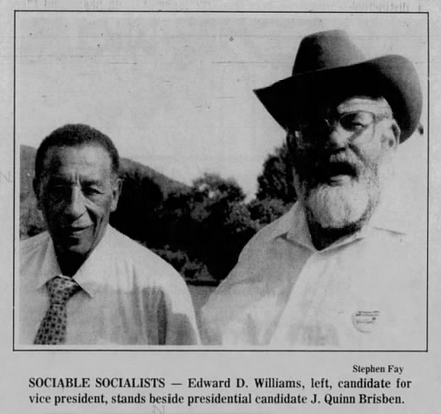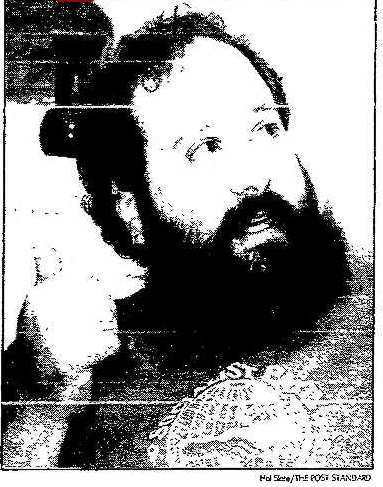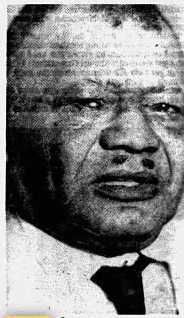Eric Chester in 1989
Eric Thomas Chester, August 6, 1943 (New York, NY) -
VP candidate for Socialist Party of the United States of America (aka Socialist Party USA aka Socialist Party aka Liberty Union Party aka Independent) (1996)
Running mate with nominee: Mary Cal Hollis (b. 1952)
Popular vote: 4,767 (0.00%)
Electoral vote: 0/538
The campaign:
The Socialist Party USA in 1996 ran Mary Cal Hollis of Colorado for President and Eric Chester of Massachusetts as her VP.
Their platform and priorities were summed up in the voters pamphlet for Oregon:
A Single-Payer National Health Program = We must remove profit from health care. It is the basic right of every person to lead a healthful life. Health care must emphasize preventive medicine, the right to choose alternative types of care, increased publicly-funded research to combat widespread disease, and the elimination of poverty, a major source of illness.
Corporate Accountability = In corporate America, only profits count! Our government has allowed the ravaging of ancient forests and public lands, and contamination of our soil, air and water. This disregard for the health of families makes a mockery of "family values." We must reign in corporate America and hold them responsible for their actions!
A Humane Foreign Policy = We must slash our defense budget, stop arming the world and refuse aid to human rights abusers. It has been the Democratic and Republican administrations- more concerned with corporate profits than human rights- who have rationalized granting "most favored nation" status to Communist China, guaranteeing the payment of wheat to Iraqi Dictator Saddam Hussein, and restoring the solid gold plumbing in the Emir's palace in Kuwait!
An Economy that Benefits All = Only the rich favor "trickle down" economics. We support living wages, worker control of industry through democratic control of the workplace, a punitive tax on runaway corporations, and the repeal of NAFTA, GATT, so-called "right to work" laws, and the Taft-Hartley Act.
The Party had made an attempt to act as an umbrella for other groups on the Left and were successful in gaining the support of Vermont's Liberty Union Party, but failed to convince the Green Party and Peace and Freedom Party. Hollis herself was actually a member of the Green Party as well.
The advent of Internet became an unexpected recruiting tool as the SPUSA experienced a spike in interest from young voters.
Chester had compared the mainstream choice of Clinton-Dole in the 1996 election to that of Carter-Ford in 1976, suggesting there was not much daylight between the two in terms of economic policy.
During the low-budget campaign Hollis described an all too common scenario for third party candidates of driving her own car around the country, depending on the support of volunteers for lodging and food, and having her campaign schedule be interrupted by a real life job which in her case was serving as a teacher in special education.
At some point in 1996 Chester was apparently involved in a serious automobile accident in New York City which sidetracked him for a bit while he recovered from injuries.
Hollis and Chester had expressed a hope the SPUSA would be on the ballot in 15 to 20 states but they were listed in only five, and recorded write-ins in seven more. Their ballot vote results: Oregon 0.14%, Vermont 0.11%, Arkansas 0.06%, Colorado and Wisconsin 0.04% each.
Election history:
1968 - University of Michigan Board of Regents (New Politics Party) - defeated
1999 - Socialist Party of the United States of America nomination for President - defeated
2002 - US House of Representatives (Mass.) (Socialist Party of the United States of America) - defeated
2003 - Socialist Party of the United States of America nomination for President - defeated
2006 - US House of Representatives (Mass.) (Socialist Party of the United States of America) - defeated
2007 - Socialist Party of the United States of America nomination for President - defeated
Other occupations: author, economics professor, Elector for the New Politics Party 1968, member of Industrial Workers of the World.
Notes:
Was an Elector for the Cleaver/Hochman New Politics Party ticket in Michigan 1968
Now lives in Glasgow, Scotland
Joined the SPUSA around 1980
















































